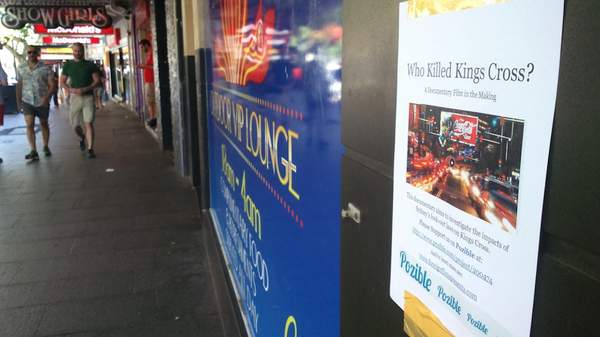Overview
Two documentary filmmakers living in Kings Cross are taking their cameras in hand and asking some serious questions about the lockout laws. Have assault rates really decreased? How is the local economy faring? Has Kings Cross been unfairly targeted? Have other entertainment precincts reaped a commercial advantage? And, at the end of the day, who's in charge of the future: residents, local businesses, developers or the council?
If similar issues have been nagging you, grab some change and throw them at Tim DiMuzio and Tim Onslow's doco project, Who Killed Kings Cross? before its Pozible deadline this Wednesday, November 11.
The seeds for the project were first planted in February last year, shortly after the controversial lockout laws came into place. "We started talking to local businesses and people, and realised there's a story here – probably a really big one," says DiMuzio. "Kings Cross has always gone through transitions as a neighbourhood, but this one seems to be quite drastic and quite targeted and unfair to local businesses."
While high-profile closures, like that of Hugo's Lounge, have received plenty of attention in the media, there hasn't been much coverage of the impact on business owners' mental health. "Some people bought their businesses for millions of dollars and had to go into debt to do it," says DiMuzio. "They're now stuck with that debt, so they're suffering mental health issues."
Meanwhile, despite claims of reduced violence, many reports demonstrate that it's simply moved to other suburbs. In Newtown, for example, alcohol-related crimes have increased by 18%. "Rather than dealing with the actual problem of violence in masculine culture in Australia through education or cultural transformation, [the Government has introduced] a blanket law that penalised, in our view, the wrong people," says DiMuzio.
He and Onslow will also investigate underlying issues, such as developers' interest in gentrifying the Cross to take advantage of increasing property values, and plans to turn the Casino and surrounds into a hot spot for nightlife.
"There was no consultation whatsoever. There was no impact assessment in terms of what the laws would do to the neighbourhood. And there was no discussion of the fact that they're disproportionate – some areas are just magically excluded," says DiMuzio. "The rule of law means that no one's above it. It applies to everyone equally. But this is now an exception…The traffic is going to Newtown. The traffic is going to Pyrmont. The traffic is going to the Casino. The laws haven't killed nightlife and they haven't killed violence and yet the property developers seem to be elated about them."
Tim DiMuzio is a Senior Lecturer at the University of Wollongong with a PhD in International Relations and Political Economy from York University. He's the author of The 1% and the Rest of Us, Debt as Power and Carbon Capitalism: Energy, Social Reproduction and World Order. Co-director Tim Onslow is a Darlinghurst-born writer, who made the finals of the Lloyds Bank Channel 4 Film Challenge and has won awards from the BBC and WHSmith for his fiction and poetry.
To support this documentary project, visit their Pozible page.
